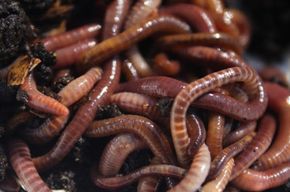Red Wiggler Worms - Enhance Your Dirt Health Naturally
Red Wiggler Worms - Enhance Your Dirt Health Naturally
Blog Article
Red Wiggler Worms Demystified: Unlocking the Secrets of Vermiculture for Greener Living and Nutrient-Rich Dirt
In the realm of sustainable practices for improving soil high quality and advertising eco-conscious living, red wiggler worms play a critical yet usually forgotten role. These simple creatures have the amazing capacity to transform organic waste into nutrient-rich castings that function as a powerful natural plant food. By diving right into the world of vermiculture, one can reveal a variety of advantages that expand much beyond standard composting techniques. Understanding the complexities of looking after these worms, optimizing their environment, and utilizing their spreadings can cause a greener way of living and healthier soil for plants to prosper.
The Role of Red Wiggler Worms
Red Wiggler worms play an important role in composting systems by efficiently breaking down raw material into nutrient-rich spreadings. These voracious eaters consume a selection of organic products, such as kitchen scraps, yard waste, and paper products. As they feed, the worms' digestion procedures break down the natural matter right into a penalty, dark, and nutrient-dense product called worm spreadings or vermicompost.
The castings generated by Red Wiggler worms are highly beneficial for soil health and wellness and plant development. They are rich in necessary nutrients like nitrogen, potassium, and phosphorus, which are crucial for sustaining healthy and balanced plant development. In addition, worm spreadings consist of useful microorganisms and enzymes that assist enhance dirt framework, increase water retention, and enhance nutrient uptake by plants.
Advantages of Vermicomposting

In addition, vermicompost, the nutrient-rich output of vermicomposting, functions as an exceptional organic fertilizer and dirt conditioner. It improves soil structure, improves dirt oygenation, and enhances soil moisture retention. These residential or commercial properties add to much healthier plants with stronger root systems and better resistance to diseases and bugs. Vermicompost additionally enhances the dirt with necessary nutrients like potassium, nitrogen, and phosphorus, promoting plant development and total soil fertility.
Additionally, vermicomposting assistances sustainable horticulture techniques by supplying a natural and chemical-free option to synthetic fertilizers. Red Wiggler Worms. This ecologically pleasant strategy not just enriches the dirt yet also helps in reducing reliance on harmful chemicals, advertising a greener and extra lasting means of gardening
Establishing a Worm Container
When developing a worm bin for vermicomposting, correct configuration is vital to ensure the success of the composting process. The first action in setting up a worm container is choosing a suitable container.
After including the bed linen, introduce the red wiggler worms to the bin. The worms must then be provided with food scraps such as fruit and vegetable peels, coffee grounds, and eggshells.
Routinely keep an eye on the dampness degrees and temperature in the worm bin their explanation to make sure optimal problems for the worms. With appropriate configuration and upkeep, the worm bin will effectively transform organic waste right into why not try this out nutrient-rich compost for your plants and yard.
Collecting Worm Castings
To effectively accumulate nutrient-rich worm castings from your vermicomposting system, a methodical harvesting method is crucial. When it comes time to collect the worm spreadings, there are a couple of essential steps to follow to make certain an effective procedure.

Troubleshooting Common Issues
Identifying and attending to common challenges that may occur throughout the vermicomposting process is crucial for keeping a effective and healthy and balanced worm bin. One usual concern that vermicomposters encounter is overfeeding. Adding excess food scraps can bring about an accumulation of dampness and level of acidity in the worm bin, possibly hurting the worms. To avoid this, feed the worms in small amounts, making sure that the food scraps are effectively damaged down prior to including more. An additional issue is unpleasant odors rising from the worm bin. Foul smells show anaerobic problems, generally triggered by overwatering or inadequate ventilation. To remedy this, readjust the wetness degrees by adding completely dry bed linens materials like shredded paper or cardboard and increase aeration by transforming the bed linen routinely.
In addition, if the worm populace is decreasing or the worms appear undesirable, maybe because of environmental stressors such as extreme temperatures or pH degrees. Monitoring these factors and making essential check here changes is important for the well-being of the worms. By repairing these usual problems immediately, vermicomposters can guarantee a smooth and successful vermicomposting procedure while preserving a prospering worm population.

Final Thought
In final thought, red wiggler worms play a vital duty in vermiculture by damaging down natural issue right into nutrient-rich dirt. Establishing up a worm container is crucial for successful vermiculture, and harvesting worm castings offers important compost for gardening.
As they feed, the worms' digestive system procedures damage down the natural matter into a fine, dark, and nutrient-dense material understood as worm spreadings or vermicompost.
The castings created by Red Wiggler worms are extremely advantageous for dirt health and wellness and plant development. Adding excess food scraps can lead to an accumulation of wetness and level of acidity in the worm bin, potentially damaging the worms.Additionally, if the worm populace is declining or the worms appear undesirable, it might be due to environmental stressors such as extreme temperatures or pH degrees. Establishing up a worm container is crucial for successful vermiculture, and gathering worm castings gives beneficial compost for gardening.
Report this page